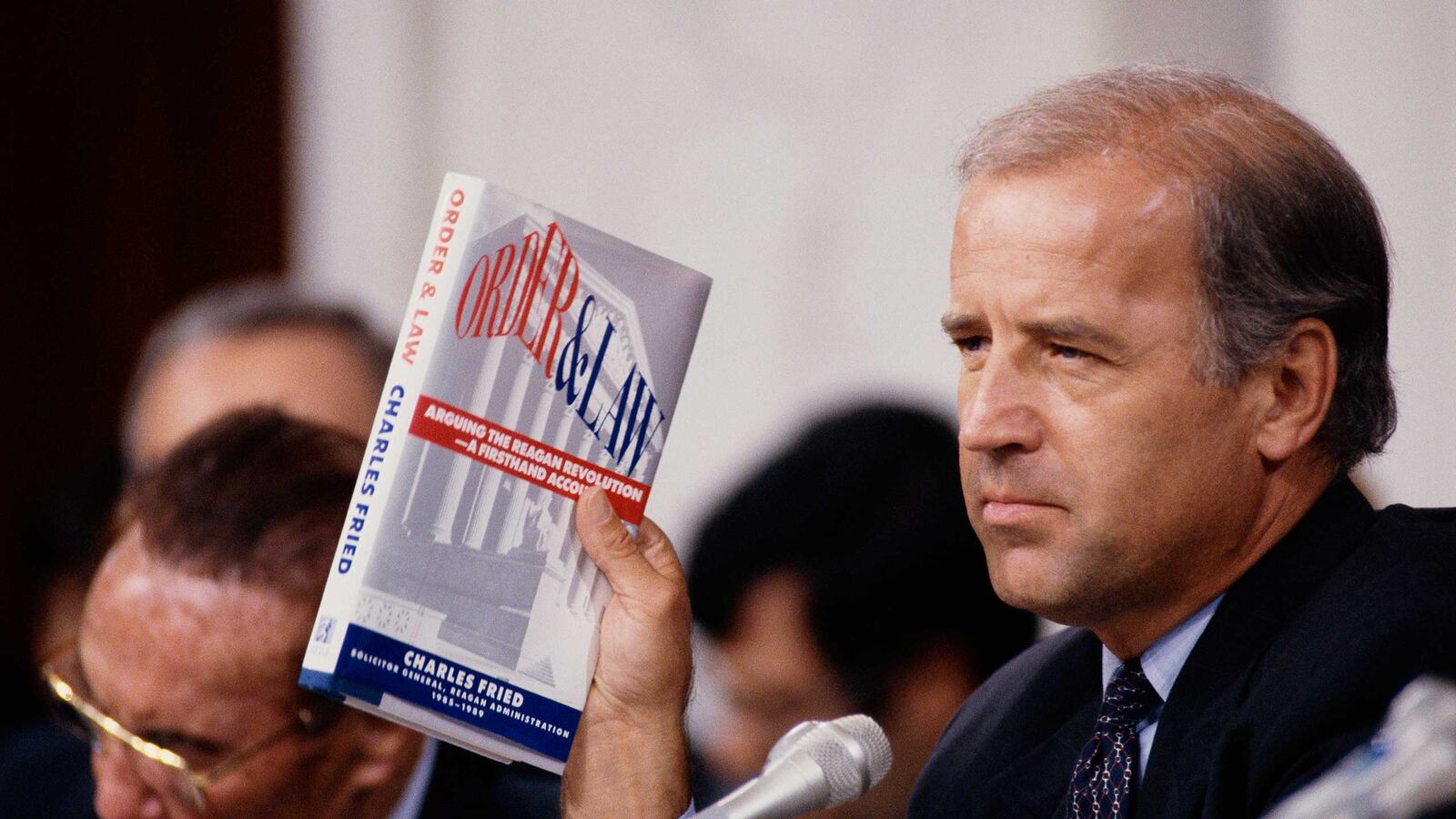One can only assume from Joe Biden’s silence the past few days that he is no longer interested in a 2020 presidential run—or having any sort of legacy as a decent, honorable straight-talking ally of women. Why else would he, a deserter of women and his own party, remain silent as Republicans use his own words as an excuse to avoid due diligence before confirming Brett Kavanaugh to the Supreme Court?
The alternate explanation is that he is so averse to making a sincere public apology for his past actions that he would rather simply hide. It’s not surprising, given he has dodged several opportunities to apologize to Anita Hill for his actions during the Clarence Thomas confirmation hearings.
As Dr. Christine Blasey Ford sat in a hearing room on Capitol Hill on Thursday, waiting to tell the entire country about an experience she never wanted to talk about, committee chairman Charles Grassley quoted former Vice President Joe Biden, who presided over—and severely botched — the Clarence Thomas confirmation hearings in 1991.
Grassley and other Republicans shilling for Kavanaugh referenced Biden repeatedly, likely in an attempt to claim that their actions would be supported by a major Democrat (and assumed presidential candidate). But as Rebecca Traister tweeted, “If you are quoting Joe Biden’s handling of Anita Hill, you’re doing it wrong.”
Investigative reporter Jane Mayer, who co-wrote the definitive book on the Clarence Thomas hearings (Strange Justice) with Jill Abramson, told NPR’s Terry Gross last year that while Hill’s hearing is often cited as a turning point in this country, it “also served as an example of what bad could come out of a woman who spoke up.”
“She was just dragged through the dirt,” Mayer said. “They accused—they questioned her motives. They suggested she was something that they called an erotomaniac. They questioned whether she was a woman scorned, whether she had personal motives, whether she had professional motives, political motives. Was this because, you know, she was trying to stop him because he was anti-abortion? They basically questioned her sanity and made her out to be a liar and potentially a lunatic.”
Sound familiar?
Republicans may not have done exactly this to Ford during her hearing. They seem to have learned some lesson from 1991, even if only a superficial one that led them to appoint a woman prosecutor to ask Ford their questions for them. But they questioned her mental health, and her memory, if not her sanity.
They applauded themselves for being gracious enough not to call her a liar, while insisting that Ford was misremembering her own trauma, despite her educated, informed and credible assertions to the contrary. Orrin Hatch referred to her as “attractive” and “pleasing” as a witness, signaling that whatever words she said had not actually penetrated his fossil of a skull.
But a lot of other things—including several of the Republican committee members—remain the same. They’ve declared up and down that they just want to hold a vote and get Kavanaugh confirmed. Back in 1991, Biden delivered a very pained, reluctant-sounding introduction to Thomas’s second hearing, in which he said the goal for the day was to “maybe start to wind this down hopefully”—as opposed to, you know, get at some semblance of truth.
Biden amicably agreed when Thomas “indicated that [he had] no desire or willingness… to go into other aspects than those that have been alleged in [his] personal life.” Republicans today refused to allow Kavanaugh’s best friend Mark Judge to be questioned (although it’s possible now he will be, after Jeff Flake forced a new FBI investigation deal on Friday).
And just as Biden treated Thomas as the arbiter of truth, seeking from him “areas of agreement” among his and Hill’s testimony “to determine whether or not there is any place from which we can logically start to begin to make the cut on who’s telling the truth,” Republicans treated Kavanaugh as the de facto neutral party, and Ford as an unreliable anomaly.
Biden closed the 1991 hearings before airing a full investigation into Hill’s claims, and notoriously suppressed several witnesses who were willing and waiting to corroborate Hill’s account of Thomas’s harassment and inappropriate behavior. (Jill Abramson once detailed the lengthy list of witnesses Biden held off, and the evidence they would have provided.) One explanation is that he was concerned about what it would look like for an all-white committee to “make the guy look stupid… it was a racial thing.”
But Hill was black, too. She was a black woman up against an all-white, all-male panel. Thomas famously complained that he was the victim of a “high-tech lynching for uppity blacks who in any way deign to think for themselves.” But wasn’t it Hill who, in being one of the first women to shine a light on the injustice of sexual harassment, was thinking for herself?
And now Republicans are crowing that in 1991, Biden said that FBI investigations are not meant to reach conclusions. There’s a whole host of things he could say, starting with “I was wrong” or “just because they don’t reach a conclusion, doesn’t mean they don’t provide information that can be critical to a congressional committee reaching an informed, non-partisan conclusion.” But he’s nowhere to be found.
Biden has painted himself as a champion of women. The Violence Against Women Act is his signature legislation. He took up as causes campus sexual assault, and then sexual assault in general, and he tours the country speaking about it. When he’s been asked about apologizing to Hill, he has supplied meek answers such as, “I wish I’d been able to more” and “my one regret is that I wasn’t able to tone down the attacks on her by some of my Republican friends” and “I feel really badly that she didn’t feel like the process worked.”
He does not, apparently, regret his own attacks. He does not regret that he only asked “straightforward and tough questions,” “legitimate questions” of Hill, and not Thomas. He does not regret that he told Thomas, “you get the benefit of the doubt, Judge,” even though there’s no criminal standard of guilt for a Supreme Court nomination hearing. Mayer and Abramson at one point got Biden to admit that by excluding talk about pornography, he acted “in fairness to Thomas, which in retrospect he didn’t deserve.” Essentially, he prized a man’s right to privacy as more valuable than a woman bravely agreeing to tell the nation about mistreatment she’d most likely rather forget.
Sound familiar?
Abramson later described Biden’s “gentleman’s agreement” on pornography as “typical of the then-all-male Judiciary Committee.” Recall that he regretted not better controlling his “Republican friends.” Biden has had a comity addiction for most of his political career, priding himself on being a sort of Democratic John McCain, a pals-y straight-talker who can get along with everyone. But if his actions are any indication, “everyone” does not include women.
To be sure, some things have changed since 1991. There are women on the Judiciary Committee, and even a few men who seem capable of seeing women as human beings, or at least as voters. They are undoubtedly making political calculations, just as Biden did when he told Abramson and Mayer that polls showed at least 85 percent of the country knew who he was, more than a majority of those surveyed felt he had been “fair.” In fact, even in 1991, he was blatantly more concerned with the politics of his actions than their fairness: “If it is concluded at the end of the process that I did not do well, I believe that would not guarantee my demise with women anymore than if I did brilliantly,” he said.
He made at least one other shocking disclosure at that time. In 1991, The New York Times reported, that there were other occasions, according to Biden, when “he had been made aware of unsubstantiated reports of wrongdoings by nominees that he did not divulge in order to protect their reputations.”
Let that sink in. Rather than take seriously, and investigate, claims about someone who was about to get a lifetime appointment to the nation’s highest court, he worried about that person’s “reputation.”
In 2008, Susan Deller Ross, a Georgetown University law professor and expert in workplace sex discrimination and one of the lawyers who advised Hill in 1991, said of the Hill-Thomas era, and particularly Biden’s role in it, “I don’t know if other people still care after all these years.”
Her doubt is understandable. Biden is a Democratic presidential candidate, after all. Lengthy character profiles in Politico and GQ don’t even mention Anita Hill or Clarence Thomas. He’s been forgiven, and forgotten, without ever having to apologize.





